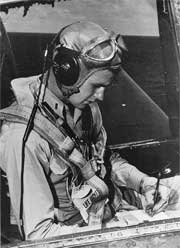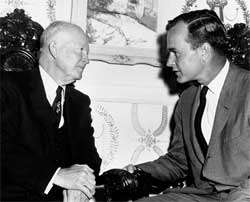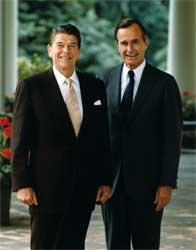George Herbert Walker Bush, the forty-first United States President (1989-1994) had served as Vice President under Ronald Reagan. He was the first sitting Vice President elected to the presidency since Martin Van Buren in 1836. Born on June 12, 1924, in Milton, Massachusetts, his father, Prescott Bush, was a banker and later a Senator from Connecticut. His mother, Dorothy Walker, was also from a wealthy family. George "prepped" at Phillips Academy in Andover, Massachusetts. During World War II, he was one of the youngest men to pilot a Navy bomber. He became a hero when he was shot down over the island of Chichi Jima in the Pacific. He was rescued by a submarine and subsequently awarded the Distinguished Flying Cross and various other medals of honor. He married Barbara Pierce in 1945, then entered Yale University where, in 1948, he graduated Phi Beta Kappa with a degree in economics.

George Bush began his working life as an equipment clerk and worked his way up to president and partner in an offshore drilling firm. He soon amassed his own fortune and had time to consider politics at the gentle urging of his father and mentor. His initial run was ambitious. He ran for Senator from Texas, where he lived with his family in Houston. That was his first political defeat.

 In 1968, he was elected to the United States House of Representatives, where he served two terms. He gained a reputation as one of the new Republicans from the South who supported and voted for the Civil Rights Act of 1968, despite the lack of support from his constituents. In 1970 he again ran for Senator and again lost. Bush, however, had made an impression on President Nixon, who appointed him UN Ambassador form 1971-72. In 1972 the Republican Party named Bush Chairman of their National Committee. He vigorously stood up for Nixon, making speeches in his defense wherever he traveled. In 1968, he was elected to the United States House of Representatives, where he served two terms. He gained a reputation as one of the new Republicans from the South who supported and voted for the Civil Rights Act of 1968, despite the lack of support from his constituents. In 1970 he again ran for Senator and again lost. Bush, however, had made an impression on President Nixon, who appointed him UN Ambassador form 1971-72. In 1972 the Republican Party named Bush Chairman of their National Committee. He vigorously stood up for Nixon, making speeches in his defense wherever he traveled.
George Bush had hoped that Gerald Ford would nominate him to be his Vice President, but, instead, Ford nominated Nelson Rockefeller of New York. For his loyal support of Republicans, Bush was awarded the position of United States liaison to Beijing, China, a position that taught him much about the politics of foreign policy. In December of 1975, Ford made him director of Central Intelligence Agency. George Bush's efforts to turn the agency around, restore its morality, and overcome its jaded recent past. When Jimmy Carter became President, Bush resigned. He and his supporters thought that 1980 was his year to run for the presidency.
 Bush took an early lead in the Iowa caucuses, but failed to maintain the momentum. It was Ronald Reagan who grabbed the lead and after losing in his home state of Texas, Bush asked his delegates to support Reagan. At the convention the delegates asked Reagan to take Jerry Ford as the Vice Presidential candidate, but this did not happen. Reagan selected George Bush. In the November elections, the Reagan-Bush ticket made a clean sweep. Bush took an early lead in the Iowa caucuses, but failed to maintain the momentum. It was Ronald Reagan who grabbed the lead and after losing in his home state of Texas, Bush asked his delegates to support Reagan. At the convention the delegates asked Reagan to take Jerry Ford as the Vice Presidential candidate, but this did not happen. Reagan selected George Bush. In the November elections, the Reagan-Bush ticket made a clean sweep.
As Vice President, Bush was the ever-present "right-hand" man, loyally defending the President and his economic plan, despite Bush's veracious attacks on them during the fight for the nomination, when he had referred to Reagan's proposed policies as "voodoo economics." Once Vice President, Bush kept his misgivings to himself. He took on many roles for the President, with whom met weekly for lunch meetings at which the two men gained respect for one another.
George Bush was an active Vice President. He traveled millions of miles to many countries as our ambassador, and headed the crisis management team under the National Security Council. He was very proactive in the campaign to stop the flow of drugs into this country from South America and other places, and he took a prominent role in combating terrorism. Although he never officially took control of the presidency as the Constitution allowed, Bush acted as surrogate President in March of 1982 when Reagan was shot, and again in 1985 when Reagan underwent cancer surgery at Bethesda Naval Hospital.

 For his efforts as Vice President, Bush was the uncontested Republican presidential nominee in 1988. One of Bush's weaknesses was, despite all of his public appearances, he never became much of an orator. Where Ronald Reagan was the Great Communicator, Bush disliked public speaking, and he often came across as flat. At the convention, however, he shined. When he was given the nomination, his acceptance speech was one of his finest. He called for "A Thousand Points of Lights," hit the road running, and named Dan Quayle, a Senator from Indiana, as his Vice Presidential candidate. They campaigned vigorously and won the election against Democrats Dukakis and Bentsen. For his efforts as Vice President, Bush was the uncontested Republican presidential nominee in 1988. One of Bush's weaknesses was, despite all of his public appearances, he never became much of an orator. Where Ronald Reagan was the Great Communicator, Bush disliked public speaking, and he often came across as flat. At the convention, however, he shined. When he was given the nomination, his acceptance speech was one of his finest. He called for "A Thousand Points of Lights," hit the road running, and named Dan Quayle, a Senator from Indiana, as his Vice Presidential candidate. They campaigned vigorously and won the election against Democrats Dukakis and Bentsen.
During the initial months of his presidency, Bush had a command of foreign policy and was cautious on all domestic issues. In 1989-1990, the Soviet Union was at the brink of internal chaos, leaving the rest of the world quite concerned as to what would happen with all of their atomic missiles. Bush seized the opportunity to make a treaty with Russia to reduce even further the nuclear arms and conventional weapons held by each country. Next on his agenda was to dispose of General Noriega, who had taken over the country of Panama and suspended free elections.
All this seemed merely a build up to the test of Bush's leadership abilities that came in August of 1990 when Iraq, led by Sadaam Hussein, attempted to take over Kuwait and it's oil fields. Bush, with his unique ability to rally friends and foes, put together a coalition of Arab and Western Countries to fight this insurgent leader. A massive contingent of armies led by General Norman Schwarzkopf conducted air strikes, and the war ended quickly. During this time Bush had unprecedented approval ratings, as high as ninety percent.
Bush was more adept at dealing with foreign policy than domestic issues. During his presidency from 1988 to 1992; the economy grew at the lowest growth rate since the Great Depression. Also, Bush went back on his promise to the people of "no new taxes," and the Democrats used this against him in a vigorous campaign. When election time came, even his own party was not unified behind him, and Patrick Buchanan staged a fight for the party nomination that took away the conservative support Bush had previously enjoyed. Furthermore, Texan Ross Perot campaigned as a Third Party alternative, draining away votes that would surely have gone to Bush. While lacking the strong mandate that George Bush had enjoyed in the previous election, Bill Clinton, a little known Governor of Arkansas, had the electoral votes to win the presidency.
As George Bush's political star set, his sons burst upon the political scene. George W. Bush of Texas and Jeb Bush of Florida each ran for Governor of his state. George W. enjoyed his first national win. Jeb would have to wait another four years before he could claim the same.

Today, George Bush and his wife, Barbara, have settled in the Houston suburbs and are still are active in many causes. George is planning his Presidential Library and writing his memoirs.
|

